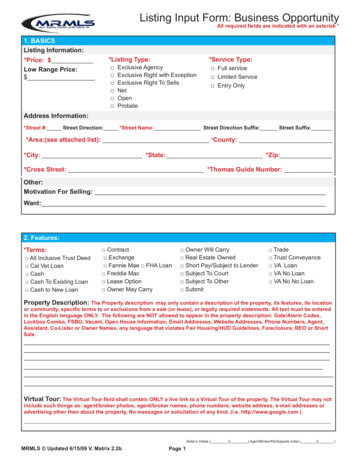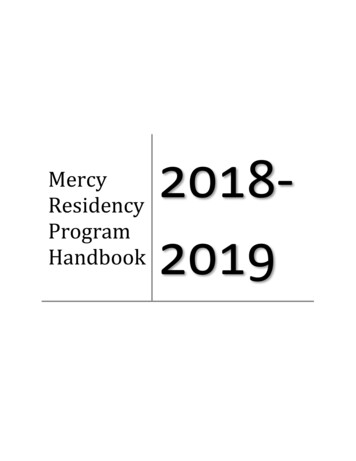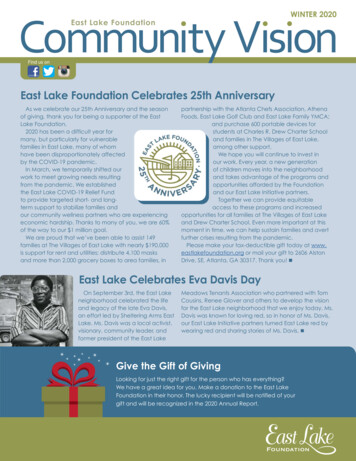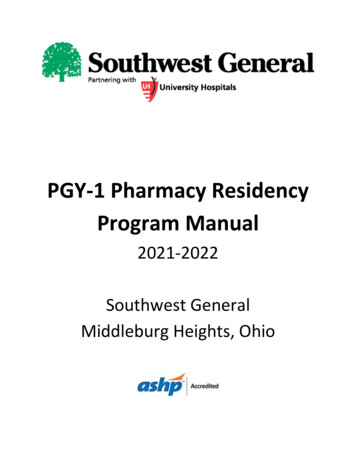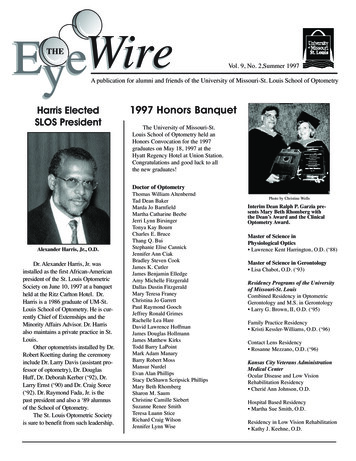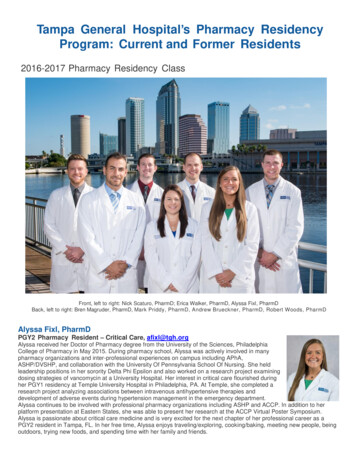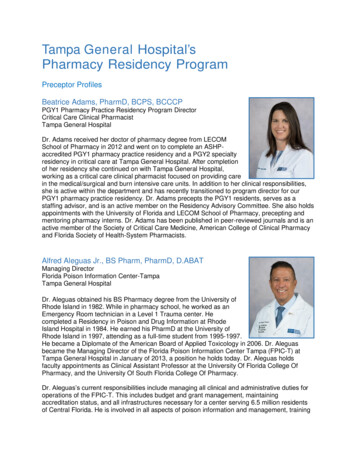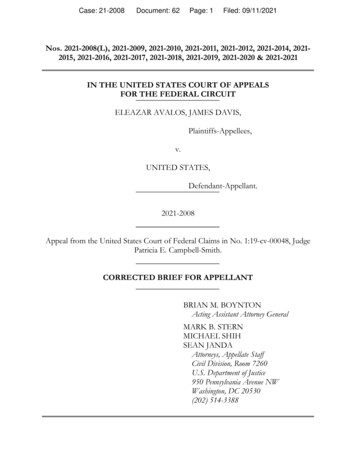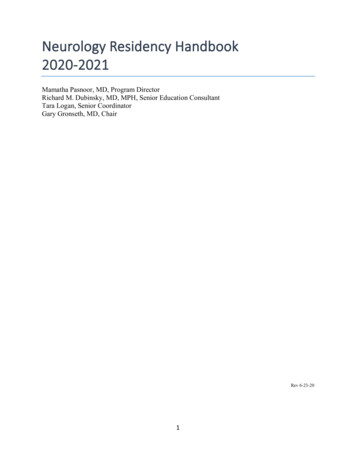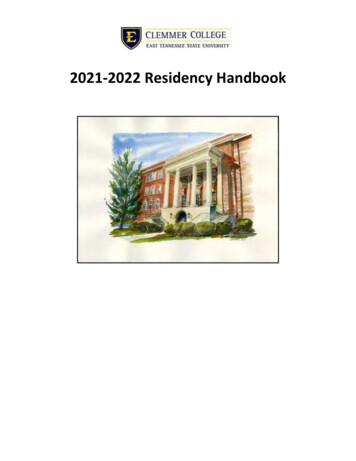
Transcription
2021-2022 Residency Handbook
Table of ContentsA Letter from the Dean pg. 4Clemmer College Administrative Office Directory .pg. 5Clemmer College Administration .pg. 6Clemmer College Faculty pg. 7Clemmer College Vision, Mission, & Goals .pg. 8Code of Professional and Ethical Behavior .pg. 9ETSU Diversity Statement pg. 10Clemmer College Conceptual Framework pg. 11InTASC Teaching Standards pg. 12RESIDENCY CANDIDATE REQUIREMENTS .pg. 13Background Check Information .pg. 14Professional Liability Insurance pg. 16Residency Candidate Code of Ethics .pg. 17Memorandum of Understanding for Residency Candidates pg. 19Praxis Information pg. 22RESIDENCY CANDIDATE INFORMATION pg. 23Understanding Residency pg. 24Clemmer College Residency Overview pg. 25Responsibilities of the Residency Candidate .pg. 26Residency Guidelines .pg. 29Guidelines for Changes in Residency Placement pg. 31RESIDENCY CANDIDATE EVALUATION INSTRUMENTS pg. 32Candidate and Mentor Weekly Discussion Summary .pg.Residency Candidate Performance Checklist pg.Observation Evaluation Schedule .pg.ETSU Lesson Plan Template .pg.Clemmer College Lesson Plan RubricInformal Teaching Evaluation and RubricTEAM Educator ObservationTEAM RubricMENTOR TEACHERMentor Teacher QualificationMentor Teacher InformationMentor Teacher ResponsibilitiesSharing Responsibilities (Mentor and Residency Candidate)Co-Teaching StrategiesTeacher Actions during Co-TeachingMENTOR TEACHER EVALUATION INSTRUMENTSCandidate and Mentor Weekly Discussion SummaryResidency Candidate Performance ChecklistObservation Evaluation ScheduleInformal Teaching Evaluation and RubricETSU Lesson Plan TemplateClemmer College Lesson Plan RubricUNIVERSITY SUPERVISORResponsibilities of the University SupervisorCriteria for SupervisorsDevelopment Plan GuidelinesUNIVERSITY SUPERVISOR EVALUATION INSTRUMENTSObservation Evaluation Schedule
Development PlanETSU Lesson Plan TemplateClemmer College Lesson Plan RubricInformal Teaching Evaluation and RubricTEAM Educator ObservationTEAM RubricAPPENDIXDue to changes in licensure standards at the state level, some policies listed in this document can change. It is theresponsibility of the student to get updated information through frequent communication with their advisors.
A Letter from the DeanDear Residency Candidate,Congratulations on reaching an important milestone on your journey to becoming an educator.It is time to apply the skills, knowledge, and pedagogical practices you have garnered in the classroom into theresidency component of your program. You will find that your residency will not only be challenging, enriching, andthought-provoking but most assuredly rewarding. This is a continuation of your growth and development, and as such,it is a time to be curious and courageous!You and your mentor will be entering into a collaborative, co-teaching relationship in which you will have ampleopportunities to contribute to the classroom, your students, and the school. Be sure to use this time with your mentorwisely! Solicit ideas, observe best practices, and affirm pedagogical theories you have studied-but most of all, enjoythis part of your journey! Remember also to bring “all of you” to this experience. Take the opportunity to use creativetechniques, instructional strategies, and powerful interventions with your students.Your success this semester will depend on your ability not only to plan and deliver instruction, but also to assessstudent learning, adjust your delivery, and teach more effectively, to name a few. If you do these things, you will beable to enrich and expand your professional repertoire in a multitude of ways that will not only help to crystalize yourinstructional philosophy but also affirm you as a teacher. Commit yourself to achieving these goals, and I assure youthat your students will learn, and your mentor teacher will greatly appreciate having you as a team member.It is our sincere desire for you to have a residency experience on which you will look back with a feeling of satisfactionand accomplishment. Again, I wish you the best in your journey into this great profession of teaching.Sincerely,Dr. Janna ScarboroughThe faculty and staff of Clemmer College welcome you and are happy to help you in your educational journey. Pleasecontact us if we can be of assistance with questions about our programs and how you can be a part of the CC family.
Clemmer College Administrative Office DirectoryCENTRAL OFFICESLOCATIONPHONEOffice of the DeanStudent Support ServicesDivision of Student Life andEnrollmentOffice of Educator PreparationCertificationOffice of Educator PreparationField Experiences and Residency319 Warf-Pickel Hall318 D.P. Culp Center302 Burgin Dossett Hall423-439-7616423-439-5396423-439-4210305 Warf-Pickel Hall423-439-7562305 Warf-Pickel Hall423-439-7597303 Warf-Pickel Hall401 Warf-Pickel Hall209 Warf-Pickel Hall501 Warf-Pickel Hall423- 439-7692423- 439-7595423- 439-7669423-439-4430321 Warf-Pickel Hall423-439-4265423 Warf-Pickel Hall423-439-7673209L Warf-Pickel Hall423- 439-7128321 Warf-Pickel Hall101 Burgin Dossett390 D.P. Culp NTS AND PROGRAMSCounseling and Human ServicesCurriculum & InstructionEarly Childhood EducationEducational Leadership & PolicyAnalysisSport, Exercise, Recreation, andKinesiologyEducational Foundations &Special EducationOTHEREducational Technology ReviewCenterClemmer Student AdvisementOffice of the RegistrarOffice of Disability Services
Clemmer College AdministrationDr. Janna ScarboroughDean of Clemmer CollegeDr. Dawn RoweInterim Chair of the Department ofEducational Foundations and SpecialEducationDr. Pamela MimsAssociate Dean for Research and GrantsDr. Julia BernardInterim Chair of the Department ofCounseling and Human ServicesDr. Cynthia ChambersAssociate Dean for Educator PreparationDr. Mike RamseyChair of the Department of Sport,Exercise, Recreation, and KinesiologyDr. Pamela EvanshenChair of the Department of Early ChildhoodDr. Jill ChanningInterim Chair of the Department ofEducation Leadership and AnalysisDr. Karin KeithChair of the Department of Curriculum andInstruction
Clemmer College FacultyProgram Coordinators: Initial LicensureDr. Kathryn SharpDr. Cathy GalyonDr. Jamie PriceDr. Ryan NivensDr. Mary Dave BlackmanDr. Kason O’NeilDr. Jennifer CookEarly Childhood-Undergraduate and GraduateEarly Childhood Special EducationElementary Education K-5Master of Arts in Teaching and Secondary EducationMusic EducationPhysical Education K-12Special EducationClinical Instructors / Master Clinicians / Field SupervisorsBlackman, Mary DaveCarter, JenniferCassell, KimCloud, JaniceCook, JenniferDetwiler, LivDuty, ClydeFacun-Granadozo, RuthGreer, KathyGaylon, CathyHitt, Sara BethHoneycutt, ScottHopson, NancyJennings, LasShayLivingston, AngelaMooneyham, JohnMoore, JanneseOlson, LeAnnPiercy, SallyRingley, AmberSharp, KathrynShelton, AngelaStreet, AprilTreece, MichelleWhitson, SuEllenYates, Terryl (edTPA Coordinator)
Clemmer College Vision, Mission & GoalsClemmer College has a vision to enhance the lives of students, faculty, staff, and community through quality programsthat shape the future.The mission of Clemmer College at East Tennessee State University is to support a diverse student experience throughresearch and service on campus and in the community. Through research, scholarship, and partnership with schooland human service organizations, the college is committed to promoting human development for a global societythrough engaged citizenship and life-long learning. Clemmer College aims to promote a collaborative environment forfaculty, staff, and students of various backgrounds to learn, work, and grow.The current CC goals are to: Provide rich educational experiences for our students.Value diverse communities, regional experiences, travel abroad, service-learning, and community- basededucation along with local, national, and global partnerships.Provide research and service activities to enhance community partnerships around the world.Value the contributions of diverse people, cultures, and devote thought to intellectual, social, economicdevelopment, and wellness.Assist our students, faculty, and staff in developing leadership capabilities to impact the present and shapethe future in a global society.Value the pursuit of life-long learning and personal wellness for a successful life balance.
Code of Professional and Ethical BehaviorsBy becoming a member of the campus community, students agree to live by thestandards of the honor code and thereby pledge the following:“I pledge to act with honesty, integrity, and civility in all matters.”-Honor Code and PledgeContact Information:East Tennessee State UniversityDivision of Student Life and EnrollmentPost Office Box 70725Johnson City, TN USA 37614-0710Email: studentlife@etsu.eduTelephone: (423) 439-4210Fax: (423) 439-6454The Division of Student Life and Enrollment Offices are located on the 3rd floor of Burgin Dossett Hall and are openfrom 8:00 a.m. to 4:30 p.m. Monday through Friday.
East Tennessee State UniversityDiversity StatementEast Tennessee State University recognizes that the pursuit of knowledge and understanding is enriched by anenvironment in which people of diverse backgrounds learn together and from each other, and participate in free andgenuine exchange of views. It recognizes that all members of the University community benefit from diversity and thatthe quality of learning, research, scholarship, and creative activities is enhanced by a campus climate of inclusion,understanding, and appreciation of differences and the full range of human experience. ETSU must prepare studentsto function successfully in a diverse society. A university diverse in its people, curricula, scholarship, research, andcreative activities expands opportunities for intellectual inquiry and engagement, helps students develop criticalthinking skills, and prepares students for social and civic responsibilities.ETSU aspires to be an institution that celebrates diversity by welcoming all students, faculty, administrators, and staffas respected and valued participants in the University's educational mission. Therefore, ETSU welcomes people ofdifferent races, ethnicities, religions, creeds, national origins, genders, sexual orientations/gender identity, physicalabilities, ages, veteran status, and social, economic, or educational backgrounds. ETSU is particularly committed towelcoming groups that have been traditionally underrepresented or excluded. The University also supports andencourages the promotion of diversity in its curricula, programs, faculty research, scholarship, and creative activities.ADA (Disability Services)The Americans with Disabilities Act (ADA) was enacted in 1990. The Act prohibits discrimination in employmentagainst qualified persons who have a disability. The ADA also prohibits discrimination against persons with disabilitiesin State and local government services, public accommodations, transportation, and telecommunications.
Clemmer College Conceptual FrameworkThe conceptual framework that now guides the unit was developed through a series of faculty retreats, and laterrevised by the Conceptual Framework Committee. The Conceptual Framework was again formally revisited through aseries of meetings that included community representation as well as the faculty in the College. Recommendationswere made to clarify, redefine, and reframe the concepts to better reflect the needs and requirements for successfulteachers and professionals in the 21st century. The Conceptual Framework specifically guides the EducatorPreparation programs within the College, and, where appropriate, also applies to the various non-licensure programshoused within the College. The framework is comprised of nine dimensions that come together to inform the tenth:Leadership.Teaching is Leading for the FutureLeadership (The Tenth Dimension)Dimension 1: General KnowledgeDimension 2: Content KnowledgeDimension 3: Pedagogical KnowledgeDimension 4: DiversityDimension 5: Professional CollaborationDimension 6: Reflective PracticeDimension 7: Self-directed, Lifelong LearningDimension 8: CaringDimension 9: Professional and Social Responsibility
InTASC Model Core Teaching StandardsThe Learner and LearningStandard #1: Learner Development. The teacher understands how learners grow and develop, recognizing thatpatterns of learning and development vary individually within and across the cognitive, linguistic, social, emotional,and physical areas, and designs and implements developmentally appropriate and challenging learning experiences.Standard #2: Learning Differences. The teacher uses understanding of individual differences and diverse cultures andcommunities to ensure inclusive learning environments that enable each learner to meet high standards.Standard #3: Learning Environments. The teacher works with others to create environments that support individualand collaborative learning, and that encourage positive social interaction, active engagement in learning, and selfmotivation.ContentStandard #4: Content Knowledge. The teacher understands the central concepts, tools of inquiry, and structures ofthe discipline(s) he or she teaches and creates learning experiences that make the discipline accessible andmeaningful for learners to assure mastery of the content.Standard #5: Application of Content. The teacher understands how to connect concepts and use differingperspectives to engage learners in critical thinking, creativity, and collaborative problem solving related to authenticlocal and global issues.Instructional PracticeStandard #6: Assessment. The teacher understands and uses multiple methods of assessment to engage learners intheir own growth, to monitor learner progress, and to guide the teacher’s and learner’s decision making.Standard #7: Planning for Instruction. The teacher plans instruction that supports every student in meeting rigorouslearning goals by drawing upon knowledge of content areas, curriculum, cross- disciplinary skills, and pedagogy, aswell as knowledge of learners and the community context.Standard #8: Instructional Strategies. The teacher understands and uses a variety of instructional strategies toencourage learners to develop deep understanding of content areas and their connections, and to build skills to applyknowledge in meaningful ways.Professional ResponsibilityStandard #9: Professional Learning and Ethical Practice. The teacher engages in ongoing professional learning anduses evidence to continually evaluate his/her practice, particularly the effects of his/her choices and actions on others(learners, families, other professionals, and the community), and adapts practice to meet the needs of each learner.Standard #10: Leadership and Collaboration. The teacher seeks appropriate leadership roles and opportunities totake responsibility for student learning, to collaborate with learners, families, colleagues, other school professionals,and community members to ensure learner growth, and to advance the profession.
RESIDENCYCANDIDATEREQUIREMENTS
Background Check PackageAll graduate and undergraduate students who participate in an internship or residency placement are required tocomplete a new background check package, which consists of fingerprinting and required documentation. Thisbackground check package will be housed in the OEP and on file with TBI.*An Affirmation of Background Check will not be accepted.Background Check Package documentation includes:VECHS Waiver Agreement and Statement Form - Authorizes Clemmer College access to fingerprinting results fromanyone requiring a background check through the college.Noncriminal Justice Applicant's Privacy Rights Form - Prevents Clemmer College from releasing background checkhistory and/or information to any outside agencies.ETSU Authorization for Background Check Entry Form- Enforces background check guidelines from Tennessee Bureauof Investigation.Please follow the directions when submitting these forms to the Office of Field Experiences and Residency afterfingerprinting has been completed.1). Print out and complete all three authorization forms linked above. (Must have actual signature-no electronicsignatures will be accepted.)2). Email the forms to the Office of Educator Preparation at mailto:edprep@etsu.eduOr place completed forms in a sealed envelope. Mail the sealed envelope to the following address:East Tennessee State UniversityClemmer CollegeResidency OfficePO Box 70685Johnson City, TN 37614Or drop off in a sealed envelope to:East Tennessee State UniversityClemmer CollegeWarf-Pickel 305Johnson City, TN 37614Fingerprinting Directions:Follow the steps outlined below to complete the fingerprinting process:1. Using your web browser, go to https://tn.ibtfingerprint.com/workflow/28TY72 and click "Schedule a NewAppointment."
2. Enter Service Code 28TY72 (if applicable). Click Continue with Child-Related Worker Volunteer (Private) servicecode.3. Enter ORI number TNCC90028 and select go. Then click yes to confirm that East Tennessee State University iscorrect.4. You will have to read an acknowledgment/ release form. Check I agree and select go.5. Enter a zip code to determine the closest fingerprinting location.6. Click on the word "Schedule" across from the location you want, under the day you wish to be fingerprinted. If youwant a date further in the future, select the Next Week link to display more dates.7. Once you select the location/date combination, select the time for your appointment and select go.8. Complete the demographic information page. Required fields are indicated by a red asterisk (*). When complete,select "Submit" Information.9. Confirm the information. Follow the on screen directions to make any necessary changes. Once you see the data iscorrect, select "Go."10. If you are required to pay for your own fingerprinting, then you will be presented with payment options. Completeyour payment process and select "Go."11. Print your confirmation page.12. Bring approved identification documents with you to the appointment. These approved document options areidentified on your confirmation page of your appointment.13. Arrive at the facility at your appointed date and time.14. The Enrollment Officer at the site will check your ID, verify your information, verify or collect payment, captureyour fingerprints, and submit your data.**If you are an international student or non-Tennessee resident and need to complete fingerprinting, please come bythe Office of Field Experiences and Residency to obtain appropriate paperwork. You may also call (423)439-7597.
Professional Liability InsuranceProof of InsuranceETSU requires residency candidates to obtain Professional Liability Insurance before entering residency. Liabilityinsurance should be purchased after May 31st so coverage will remain in effect the duration of their residency year.Candidates should turn in proof of liability insurance (copy of card or receipt) to the Office of Educator Preparation byJuly 1st of their residency year. Proof of insurance can be submitted electronically to the Office of EducatorPreparation at edprep@etsu.edu or bring a printed copy to the office in Warf Pickel Hall, Room 305. Proof ofinsurance must be on file in this office.There are several ways to procure professional liability insurance:I.STEA - http://teateachers.org/student-tea-stea. - You may obtain STEA/NEA student insurance online.Coverage is from September 1 to August 1; therefore, students will need to purchase enrollment for twoyears to cover Pre-Residency, Residency I and II (July-June). Cost is approximately 35.00. If you chose thisoption, you would need to contact STEA to ensure coverage begins from the date of purchase.II.Professional Educators of Tennessee - http://www.proedtn.org/?Students. Coverage begins immediatelyand lasts for 12 months; therefore, students need to purchase after May 31st so coverage will remain ineffect the duration of the residency year. Cost is approximately 25.00.III.Forrest T. Jones - http://www.ftj.com/index.php - To be eligible, you must be a member of a participatingorganization. Some examples are National Art Education Association (NAEA), National Association forMusic Education (NAfMe), and National Association for the Education of Young Children (NAEYC). A full listof participating organizations can be found on the website. Cost and coverage will vary by organization.IV.Rider on a homeowner’s insurance policy – Check with the company that provides your homeowner’sinsurance to inquire about adding a Professional Liability Insurance rider. If you choose this option, verifythat the coverage will be good for the entire Residency experience.**If you have another insurance option available, please check with the Office of Educator Preparation to ensure thatis meets the requirements.
Residency Candidate Code of EthicsI realize the importance of the responsibilities I am to assume as a candidate and the ever- present need for a highlevel of ethics to guide me in discharging these duties. I believe in conducting myself accordingly, with specialattention directed to the following relationships:The Students1. Accept students for who they are as individual human beings of worth, with purposes, interests, and needs.2. Earn students' respect through genuine interest in them and their activities.3. Refrain from disclosing information about students obtained during residency.4. Foster critical thinking among students by examining facts and opinions on issues without imposing subjectiveopinions.5. Utilize all available evaluative techniques in assessing student learning and to assist students in makingjudgments about their own development.6. Establish only mature, professional relationships with students.The Mentor Teacher1.Accept the mentor teacher as a professional person giving of his/her time and energy to help a newteacher.2.Respect the mentor teacher’s program, goals, and practices, by striving to understand and support them.3.Avoid emphasizing differences in philosophy and practices with the mentor teacher.4.Secure approval of the mentor teacher in advance of implementing candidate plans and experimentation.5.Initiate suggestions for self-improvement during evaluation sessions with the mentor teacher.6.Keep the mentor teacher informed of any personal or professional concerns that might affect thestudents, faculty, and school or university’s relationships with the students, faculty, and school.7.Cooperate with the mentor teacher on all activities arranged for my professional growth.The School and Community1.Study and support school policies.2.Discuss school matters only with persons (principals and other administrators) responsible for formulatingand implementing school policies.3.Avoid violation of community morals.4.Refrain from unjustified or casual criticism of the school and community.5.Follow school rules and expectations for professional conduct and dress.6.Avoid use of alcohol and drugs prior to contact in a professional role with students, parents, or others.The University Supervisor1.Accept the supervisor as an East Tennessee State University faculty member concerned with assisting thecandidate to have a successful apprenticeship teaching experience.2.Seek the supervisor’s suggestions for improving learning situations for students and for implementing thecandidate’s many activities in the school and community.3.Arrange and confirm a schedule that plans for personal conferences with the supervisor.
4.5.Call, e-mail, or write the supervisor with respect to weekly schedule of candidate activities in school andcommunity.Consider all conferences with the supervisor as professional and confidential.The Residency Seminar Instructor1.Accept the seminar leader as an East Tennessee State University faculty member concerned with assistingthe candidate to have a successful apprenticeship teaching experience.2.Consider all conferences with the seminar leader as professional and confidential.3.View the seminar as an opportunity to share and learn from peers in other school settings.4.Recognize the expertise of the seminar leader in the development, analysis, and evaluation of the edTPA.The Profession1.Study toward understanding the role of a teacher within the school, the community, and the profession.2.Exhibit confidence and pride in the profession.3.Look upon the profession as a service to humankind.4.Encourage students to consider seriously the opportunities and responsibilities of the profession.5.Contribute whenever possible to student learning experiences in the school, to the school program, andfaculty planning for school improvement.6.Become an active member in appropriate professional organizations.7.Regularly read, study, and reflect upon the literature and research pertaining to education for maximumprofessional improvement.The Code of Ethics is a general outline of professional behavior. Of equal importance, however, is the understandingthat ethics are also a very personal matter.
Memorandum of UnderstandingBetweenResidency Candidate in Residency I and IIAndClemmer College and Partner SchoolsThe purpose of this Memorandum of Understanding is to clearly identify the professional dispositions and behaviorsthat Candidates are to exhibit in their yearlong Residency.ConductWhile completing the yearlong Residency, candidates must conduct themselves in a professional manner. Uponentering the yearlong Residency, Candidates agree to follow the rules of the school system as well as policies of theClemmer College and East Tennessee State University. Candidates should view this experience as an opportunity tolearn from their mentor teacher(s) and to develop and demonstrate their teaching skills. Actions taken and wordsspoken during the Residency should be carefully considered, as they will affect both the Residency evaluation and thewritten/verbal recommendations provided for the candidate by the mentor teacher, Residency I and II Supervisors,school administrators, and the Office of Educator Preparation.Residency PlacementsPlacements are made in partnership with the school districts and Clemmer College. Residency candidates are notallowed to request a specific school or mentor teacher. Candidates will be placed with a licensed and experiencedmentor teacher in the appropriate licensure area and grade ranges of their planned license. Candidates will not beallowed to request a specific grade level placement.AttendanceResidency candidates are required to be at their assigned school on the assigned days of the week. It is vital that thecandidate contact the mentor teacher and Residency I/Residency II Supervisor immediately if an event occurs that willprevent the Candidate from being on time or require the Candidate to be absent. Candidates who have absences thatare not warranted and/or fail to contact their mentor teacher and supervisor may be removed from their placement.Candidates should submit attendance in two ways: 1. Sign in and out of the building through computerizedattendance at the office. 2. Submit weekly attendance in LiveText for mentor teacher approval.Make up DaysDuring Residency I, candidates will follow ETSU’s calendar. Residency I Candidates must schedule to make upabsence(s) with the mentor teacher and the Supervisor. Residency II Candidates will have absences added to the end
of the Residency II placement. Candidates must coordinate with and receive approval from the mentor teacher andthe Residency II supervisor to make up the missed day(s). Excessive absences due to illness or other extenuatingcircumstances may interfere with graduation and/or result in a candidate’s removal from the Residency placement.Candidates in Residency II follow the calendar of the School District rather than ETSU’s calendar. (Ex: Fall and Springbreaks are based on the school calendar.)Tardies/Leaving School EarlyResidency I and II Candidates are expected to adhere to the school mandated arrival times required of the mentorteachers. Candidates must not be late nor leave early. Tardies and/or leaving the school early without a valid orapproved reason may result in removal from the Residency and/or a failing grade for Residency I and/or II. Please notethat during Residency II, Candidates are expected to arrive early and depart after established dismissal times.SeminarsAll Residency candidates must attend any seminars scheduled during the semester. The seminars are designed toprepare the candidate for his/her Teacher Performance Assessment (edTPA) that is completed during Residency II.Failure to attend the Residency seminars will affect the candidate’s performance on the Teacher PerformanceAssessment and will affect the Teac
Dear Residency Candidate, Congratulations on reaching an important milestone on your journey to becoming an educator. It is time to apply the skills, knowledge, and pedagogical practices you have garnered in the classroom into the residency component of your program. You will find that your residency will not only be challenging, enriching, and
